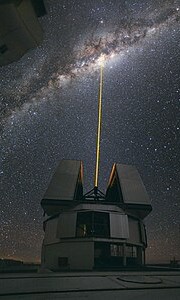|
Home
|
Jul 21, 2025
This week’s themeBack-formations This week’s words lase ablute insurrect incent tase 
Lasing the Milky Way
Paranal Observatory, Chile Photo: Yuri Beletsky / ESO / Wikimedia Previous week’s theme Biblical idioms A.Word.A.Day
with Anu GargA maker makes, a taker takes, and a shaker shakes. Simple enough. In each case, the verb came first and then we formed a noun by adding a suffix. It’s very common in the English language: nouns formed by adding an -er or -r. Sometimes it’s the reverse. We take a noun and remove a part of it to make a verb. This process is called back-formation: forming of words by removing a supposed suffix. In reality, there was no suffix. The word laser is an acronym. Some purists grumble about extending words in this way, whether by back-formation or other linguistic gymnastics. They might insist on saying “targeted by a laser beam” when we can simply say “lased”. Short and to the point. Of course, another option is to take the noun and just verb it as is, like lasered. But why, when the snappier back-formation lased does the job? This week we’ll see five words coined by the process of back-formation. lase
PRONUNCIATION:
MEANING:
verb tr.: To expose or process with a laser (e.g. to target an object or cut a material). verb intr.: To give off coherent light. ETYMOLOGY:
Back-formation from laser, an acronym for Light Amplification by
Stimulated Emission of Radiation. Earliest documented use: 1962.
USAGE:
“Additionally, a pilot vessel was lased as it was on its way back to the pilot launch.” Coast Guard Warns of Laser Strikes on Ships in Bay; Capital (Annapolis, Maryland); May 5, 2017. “We managed to lase deer-sized targets consistently out to only about 400 yards.” Andrew McKean; Range Masters; Outdoor Life (Miami, Florida); Oct 2017. A THOUGHT FOR TODAY:
The best people possess a feeling for beauty, the courage to take risks,
the discipline to tell the truth, the capacity for sacrifice. Ironically,
their virtues make them vulnerable; they are often wounded, sometimes
destroyed. -Ernest Hemingway, author and journalist, Nobel laureate (21 Jul
1899-1961)
|
|
Subscriber Services
Awards | Stats | Links | Privacy Policy
Contribute | Advertise
Awards | Stats | Links | Privacy Policy
Contribute | Advertise
© 1994-2026 Wordsmith